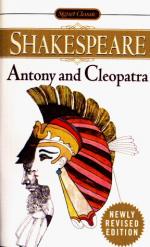|
This section contains 15,877 words (approx. 53 pages at 300 words per page) |

|
SOURCE: “‘The World's Great Snare’: Antony, Cleopatra, and Game,” in Particular Saints: Shakespeare's Four Antonios, Their Contexts, and Their Plays, University of Delaware Press, 1997, pp. 116-53.
In the following essay, Lewis identifies a Christian analogue to Antony's character and argues that understanding this parallel puts into perspective the various attitudes professed in the play regarding Antony's self-sacrificial love.
From the moment that Antony believes Cleopatra to have given him cause to kill himself—her suspected treachery in 4.12—Antony is repeatedly subjected to the ridicule normally reserved for the most foolish of Shakespeare's fools. For example, in 4.14 he is provoked to commit suicide by the mere show of Cleopatra's death, a manipulation so transparent through familiarity that Enobarbus punctures it long before this moment (1.3.133-44). Next, calling upon his trusted servant Eros to fulfill his duty, Antony is disgraced when Eros, “[t]hrice-nobler” than his master, kills himself instead...
|
This section contains 15,877 words (approx. 53 pages at 300 words per page) |

|


